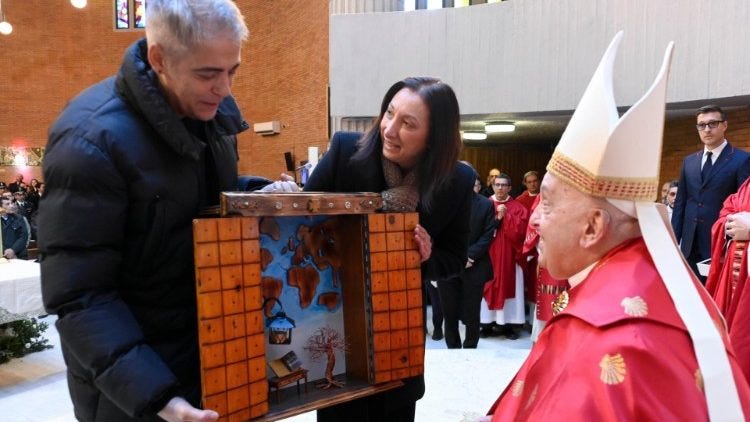Pope Shares Message of Hope with Inmates As He Opens Holy Door At Rome Prison
Francis' Jubilee Year visit marks the first time a pope has opened a Holy Door at a prison.

By Gary Gately
Pope Francis delivered a message of hope and God’s mercy at a Rome prison Thursday when he became the first pontiff to open a “Holy Door” at a prison as part of the 2025 Jubilee Year — a rich Catholic tradition that symbolizes the passage to salvation, opened to humanity by Jesus.
Francis’ visit to Rebibbia prison — where he celebrated Mass with about 300 inmates, family members and staff — came two days after he passed through the threshold of the ornate bronze Holy Door at St. Peter’s Basilica on Christmas Eve, ushering in the 2025 Jubilee Year.
Francis will open Holy Doors at three other Rome basilicas as part of the Jubilee Year. The Catholic tradition dates back more than seven centuries and is normally celebrated every quarter-century as a time of pilgrimage, repentance, forgiveness and redemption of sinners through Christ’s mercy.
“The first Holy Door I opened at Christmas in St. Peter’s,” Francis said at the prison’s Church of Our Father. “I wanted the second one to be here, in a prison. I wanted each of us here, inside and out, to have the possibility of throwing open the door of our hearts and understanding that hope doesn’t disappoint.”
Holy Doors remain closed except during Jubilee Years, and those who pass through the doors and meet other conditions can obtain plenary indulgences, which have been called “get-out-of-Purgatory-free” cards because they bring remission of punishment for sins.
The theme of this year’s Jubilee, "Pilgrims of Hope," reflects Francis’ emphasis on fostering hope, forgiveness and renewal, especially for those facing adversity.
At the prison chapel, Francis said: “Hope is like an anchor that is secured to the shore. We hold onto it with a rope, even when it hurts our hands. It pulls us forward, reminding us that there is always something good ahead.
“May the opening of this Holy Door be for all of us a call to look to the future with hope,” the 88-year-old Jesuit pontiff added. “Let us open our hearts to the mercy of God so as to celebrate with the whole church his unending love.”

After the Mass, Francis greeted each prisoner in the church and extended a greeting to those who remained in their cells.
“I pray for you every day,” he told the inmates. “I really do. It is not a figure of speech. I think of you and I pray for you. I wish you much peace.”
Francis’ visit came at a time when Italian prison overcrowding and inmate suicides have hit record highs, according to the Antigone Association, which monitors prison conditions. It reported that in 2024, 88 prisoners killed themselves, and Italy’s inmate population stood at 132% over capacity.
The association said in a statement: “We hope that this initiative of the Pontiff can rekindle attention and hope in Italian prisons” and that the government will eliminate “repressive and harsh” conditions that turn prisons into “places of revenge” and instead focus on rehabilitation and reintegration of inmates into society.
The inmates gave Francis gifts, including a miniature reproduction of the prison’s Holy Door, made of wood salvaged from migrant boats, and a basket containing oil, cookies and ceramics, and the prison administration gave the Holy Father a painting of Christ by a former prison officer.
Francis gave the prison a parchment bearing a message of hope to commemorate the visit.
In his May Bull of Indiction, the official decree establishing the Jubilee Year, Pope Francis wrote: “I think of prisoners who, deprived of their freedom, daily feel the harshness of detention and its restrictions, lack of affection and, in more than a few cases, lack of respect for their persons. I propose that in this Jubilee Year governments undertake initiatives aimed at restoring hope; forms of amnesty or pardon meant to help individuals regain confidence in themselves and in society; and programs of reintegration in the community, including a concrete commitment to respect for law.”
After the visit, Francis told reporters: “Every time I come to a prison, I ask myself: ‘Why them and not me?’ Because we all can fall, the important thing is to not lose hope, to hold onto that anchor of hope.
“We have to accompany the prisoners. Jesus says that on the day of judgment we will be judged on this: ‘I was in prison, and you visited me.’”
During the Jubilee Year, which ends January 6, 2026, ,some 32 million pilgrims are expected to visit Rome, where a host of cultural events are planned. The city has budgeted $4.6 billion for 322 construction projects, including a picturesque piazza near St. Peter’s Basilica.
Basilicas in the Holy Land and Assisi, Italy, have also been designated Jubilee pilgrimage sites, as has the Basilica of the National Shrine of the Immaculate Conception in Washington. And four other U.S. dioceses have designated churches as pilgrimage sites.
Those who can’t get to the pilgrimage sites can still obtain indulgences through works of charity or mercy such as visiting the sick, prisoners, the lonely, the elderly or the disabled; observing the penitential nature of Fridays, including by abstaining from “futile distractions” such as social media; donating “a proportionate sum” of money to the poor; or supporting religious or social works, especially those in defense of life.
Jubilee Years date to Pope Boniface VIII proclaiming the first in 1300, and they’re now normally celebrated every 25 years, though Francis called a smaller-scale interim Jubilee devoted to mercy in 2015.
But the tradition actually traces its roots to the Old Testament jubilees, celebrated every 50 years as a time for forgiveness and a reminder of God's providence and mercy.


